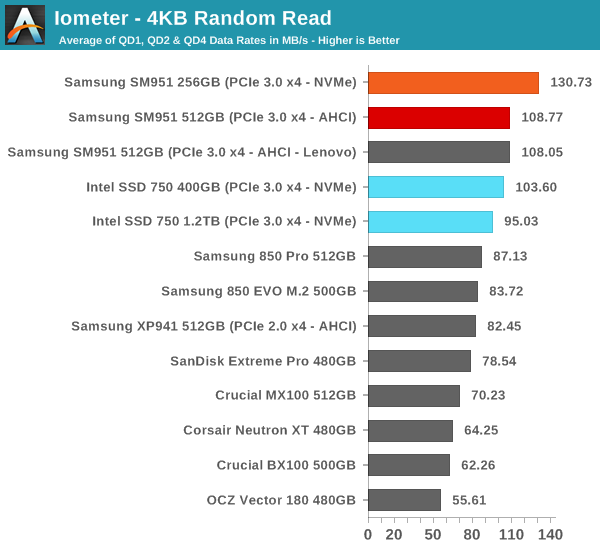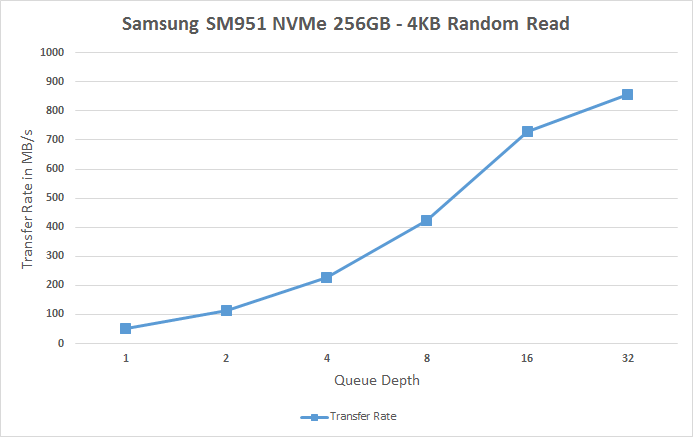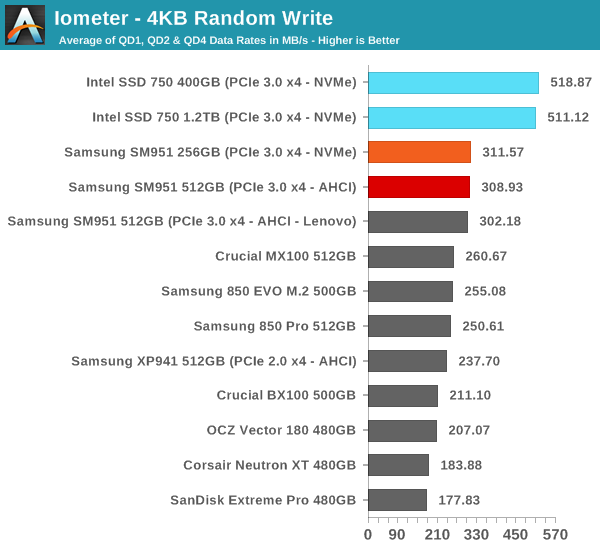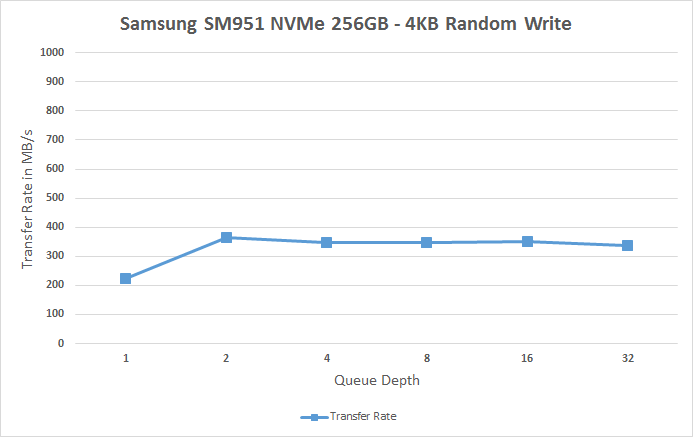Samsung SM951-NVMe (256GB) PCIe SSD Review
by Kristian Vättö on June 25, 2015 9:40 AM ESTRandom Read Performance
For full details of how we conduct our Iometer tests, please refer to this article.

This is the graph I've been dying to see ever since I first heard about NVMe. Random read performance at low queue depths was mostly bottlenecked by AHCI latency because at QD1 the controller can only read from one NAND die (it's asked to read one 4KB chunk of data at a time), meaning that a tremendous share of the latency was caused by the command overhead. As the NVMe command set is much simpler and the whole IO stack is lighter, it opens the doors for improved low queue depth performance, which is exactly what we are seeing with the SM951 NVMe.
 |
|||||||||
| Default | |||||||||
At QD1 the SM951 NVMe offers about 50MB/s, whereas the best AHCI drives I've seen hover around 30-35MB/s, resulting in about 50% gains. Performance at QD2 and QD4 is also better than what other drives offer and in general the SM951 NVMe has excellent random read performance including the high QDs as well.
Random Write Performance

NVMe doesn't present similar gains to random write performance, though. This is an area where Intel clearly has an advantage, but given that the SSD 750 carries an 18-channel controller that is hardly a surprise. Moreover, because the SSD 750 features full power loss protection Intel can cache more user data in the DRAM buffer without the risk of data loss, which can further improve random write performance as IOs can be combined more efficiently. Intel's custom driver may also help with random write performance because the native Microsoft driver has some write performance issues due to Force Unit Access (basically FUA won't consider write to be complete until it has been written to its final medium i.e. NAND, whereas Intel's driver can consider write to be complete when it reaches the DRAM buffer).
 |
|||||||||
| Default | |||||||||










74 Comments
View All Comments
bill.rookard - Thursday, June 25, 2015 - link
CentOS (Actually, RH6.5 and newer) are supposed to have in the box storage drivers for NVME. It apparently doesn't follow the same naming convention (/dev/sdx) since it doesn't utilize the SCSI protocols, but the NVME protocols.So - to check before you buy?
#modinfo nvme - should list if your kernel has built in nvme support.
if you have a drive in, check if an nvme drive is in there and is recognized
#lspci | grep nvme
SofS - Thursday, June 25, 2015 - link
Indeed, but my point was about their quality and how they compare between each other.der - Thursday, June 25, 2015 - link
10th comment!bernstein - Thursday, June 25, 2015 - link
i guess the 1tb 840 msata had either too slim margins or wasn't popular enough...still waiting for a 1tb M2 NVMe drive...
foxtrot1_1 - Thursday, June 25, 2015 - link
See you in December 2016, then.bernstein - Friday, June 26, 2015 - link
obviously i was wrong since there also is an 1tb msata 850 evo.... now i am very curious as to why samsung doesn't have a 1tb M2 ssd!!!Kristian Vättö - Friday, June 26, 2015 - link
Because all the PCIe drives use MLC NAND, which is a lower capacity die.kspirit - Thursday, June 25, 2015 - link
The connector looks the same as that on the old SATA SSDs found in most laptops. I've got a 2280 sized Intel 1500 SSD in my HP Folio (Haswell). Would this give me PCIe speeds?foxtrot1_1 - Thursday, June 25, 2015 - link
No.Metaluna - Thursday, June 25, 2015 - link
Depends on whether HP hooked up the PCIe lanes on their M.2 connector, which I wouldn't assume without checking into it. The BIOS also needs to have NVMe support. In the most common configurations (i.e. the "B" and "M" keyings), M.2 is required to carry both SATA and 2-4 PCIe lanes, but some motherboard vendors routinely violate this and leave out one or the other. Asus drops the SATA on some of their higher-end Z97 motherboards, for example, so you can't rule out that someone else may have made the opposite tradeoff.